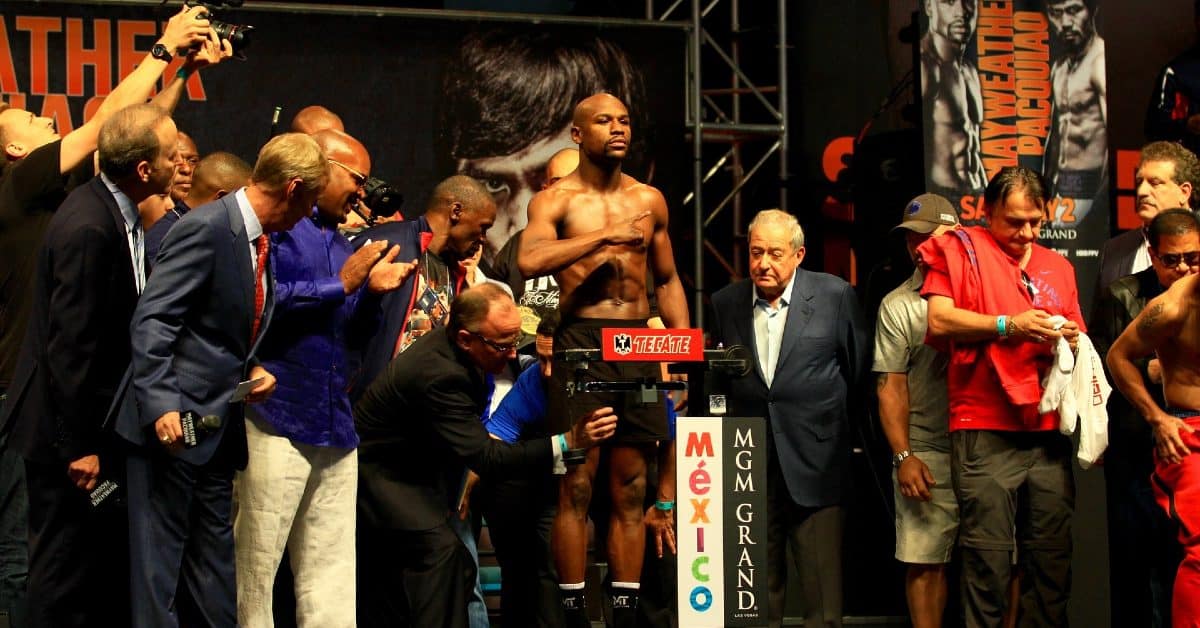From the outside boxing, weigh-ins seem fairly simple, with seventeen weight divisions, each having its boxers set. However, when you delve deeper into the weighting system, there are a lot of intricacies that categorize the boxers in their respective weight classes. So, what happens when a boxer doesn’t make the weight they were aiming for?
Depending on the boxing competition/promotion and its regulations, the repercussions of not making weight may vary. However, the most common consequence of not making weight is either a monetary penalty or the cancellation of the fight.
A weighting system is integral to a contact sport like boxing. To create an environment that allows for fair competition, a functional weighting system is necessary. Apart from repercussions for not making weight, there are multiple things you will find out about weight classes in boxing, simply by reading on!
What happens if a boxer doesn’t make weight?
For different kinds of fights, the consequences of going over the weight vary. When it comes to non-title fights, there are two categories of fighters that fall under it; Amateur and Pro. As far as amateur fights are concerned, fighters are usually given 2 hours to cut their weight before further actions are taken. If they fail to cut their weight in the given time, not only is the fight canceled, but the fighter also has to pay the promoter all expenses. These include travel expenses for both the fighters. For fighters like Andres Gutierrez, who missed weight by 11lbs, however, the flexibility of extra time isn’t shown.
On the other hand, although professional fighters are also given the levee of cutting time, the repercussions of them failing are different. On top of the fight being canceled and the fighter has to pay all promoter expenses, in a professional fight, he/she also has to pay a fine. This fine can either be 10% of their purse or 150$ for every pound they went over. Whichever amount is greater is selected as the penalty.
For title matches, the rules of making weight are the same for both amateur and professional fighters. If the reigning champion who is defending his/her title cannot make weight even after the extra two hours, they will automatically lose their title on the scale. The same rule applies to a non-title holder fighting for a vacant title. However, in both cases, if the fighters are still within a legal weight spread by catch weight, they may still be allowed to fight but not for the title.
Finally, the compensation to the promoter for all the financial investments made for the fight is a must no matter which kind of fight it is.
How many days before a fight is the weigh-in?
The responsibility to schedule a weigh-in time frame lies on the promoter with the time frame not exceeding three hours. At the same time, the official weigh-ins can take place on two separate days or one day. However, the constant is that a weigh in must take place on the day of the event or one day before the event. However, under special circumstances, weigh-ins may be scheduled on both days. In case two weigh-ins are scheduled, both fighters must weigh in on the same day as weighing in separately is not allowed.
When it comes to whether or not the same day weigh-in is viable, there is a lot of discourse. A valid argument posited suggests that since fighters often dehydrate themselves to make weight, it would be physically impossible for them to rehydrate themselves for the fight on the same day. Simultaneously as far as the marketing of a fight is considered, a weigh-in one day before the fight allows the promoters to build the necessary hype for the fight.
On the other hand, some people argue that the same day weigh-in is fairer as it shows the fighters’ exact weight before they fight. It is also argued that the one-day time frame allows some fighters whose bodies gain weight much faster to appear 10-13 heavier to the fight, which is unfair. However, at the end of the day, dehydrated fighters who are unable to make it past round 3 is a much bigger loss than a fluctuation in the weight on the day of the fight.
As far as the weigh-in, in general, is concerned, there are some rules which are constant in all formats. The most important one is that every fighter and trainer has the right to witness their opponent’s weigh-in. In case a fighter misses the weigh-in time window of three hours, they will be disqualified from the event unless they have a valid excuse.
How do boxers lose weight fast?
Weight-cutting is a process that every fighter and his/her team will have a different strategy to approach. While making weight and not going higher itself is a grueling task, losing weight to drop down in your weight class for a fight is an even more difficult task.
To make weight on the day of the fight, one of the best strategies fighters employ is maintaining weight as they train for the fight. This is done by maintaining a strict calorie specific diet combined with a routine of road work and cardio to keep your metabolism running.
Apart from that, to make sure fighter don’t exceed the weight on the day of the fight, they go through a rough couple of days leading up to the fight. Not only do fighters dehydrate themselves at least 24 hours before the fight, but they restrict their calorie intake as well. To make matters more difficult, they also partake in training that would cause their body to sweat and consequently lose more weight. This could be running on a treadmill or cycling in a sauna.
As far as losing weight to drop in weight class is concerned, it is even more straining. Not only do fighters have to restrict their diet significantly to make the weight in a short time, but they also have to continue intense training to make sure they don’t compromise on fitness. Usually, their diet would mostly consist of protein and fat with a very little salt and no fruits or sugar. Naturally, the process of cutting weight comes with its risks, which can only be minimized if you are cutting weight sustainably with professional help.
Here is the article that explains a weight loss process step by step.
How much do boxers lose for a weigh-in?
The amount of weight a boxer needs to lose before a fight depends entirely on that match’s set weight. It is physically possible for a fighter to lose up to 30 pounds in 48 hours before the fight. While some fighters cut a few pounds of weight to fight in divisions close to their actual weight, others drop weight drastically to have a size advantage over their opponents.
Using your weight as a tactic to get the upper hand is very common in a sport like boxing. While some boxers would lose 30 pounds before a weigh-in and gain it back by the time the fight day comes, others would just gain extra weight on the fight day. An example would be Tyson Fury drinking gallons of water before weighing in to gain a psychological advantage over Deontay Wilder in their recent bout.
Although there is no set amount of weight a boxer has to lose for a weigh-in, a boxer weighing 170 pounds at the weigh-in may weigh 200 pounds on the fight day.
How do boxers gain so much weight overnight?
Gaining weight before a fight is much easier when compared to losing weight. After losing a considerable amount of weight before a weigh-in, fighters undertake an intense rehydration and food intake program one day before the fight. Not only does this involve massive intakes of water, but it also includes intake of top-notch sports drinks. The purpose of using sports drinks is to restore the lost electrolytes in the fighter’s body.
Simultaneously their diet to gain weight is one with high carbohydrates to make sure their energy is restored for the fight. Although not as risky as losing weight, the process of gaining weight can also cause fighters to fall ill after drinking huge sips of water constantly. This is why it is advised to drink the same amount of water, but with smaller sips, so your body accommodates the large intake.
Do boxers have to weigh the same?
In most cases, the boxers don’t need to weigh the same. Their weight only needs to be in the weight division they are fighting in. For instance, in boxing, the upper limit for welterweight is 147 pounds, which means any fighter in that division cannot exceed 147 pounds.
On the other hand, in some contract-based fights, specific weight is decided. In such cases, your weight has to be the same as what is decided in the contract. Although some flexibility may be shown for a difference of 1-2 pounds, anything more than that, and you won’t be eligible to fight.

